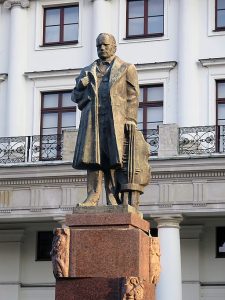Foreign Language Centre
Inspiring
Stanislaw Moniuszko
Stanislaw Moniuszko, composer, conductor and educator, is called the father of Polish national opera. He was one of the most outstanding composers of Polish Romanticism, along with Frederic Chopin and Henryk Wieniawski. The works that brought him fame and recognition in wide circles of music lovers throughout Europe were songs, symphonic works, operettas and predominantly beautiful operas. The most ‘national’ ones are Halka and The Haunted Manor, but he composed 20 of them in total.
His operas are masterpieces, full of colorful genre scenes, engaging and melodic, and yet they are extremely rare on the world’s biggest opera stages. Why? The reason is the truly national character of these works. Their content is embedded in Polish history and culture, and they are full of elements of Polish folk music.
Moniuszko lived between 1819 and 1872, a really difficult time when Poland was under partition, existing only in the hearts of Poles. His entire work was characterized by motifs of Polish folklore, love for Polish traditions and the Homeland.
In 1843 he began publishing the Home Songbook, which was published on a regular basis for a dozen years. It contained sets of songs ” for everyday use”, for which Moniuszko was loved by masses of his countrymen. French and Italian songs, performed in salons and courts, were replaced by Moniuszko’s songs. Anyway, they are sung to this day. We all know Prząśniczka, Krakowiak, Znasz-li ten kraj or Świtezianka. There were as many as 268 of these songs collected in 12 notebooks.
His most famous piece is undoubtedly Halka, first staged in 1854 in Vilnius. Soon Halka premiered on numerous European stages, including Krakow, Odessa, Prague, Vienna, Kiev, Lviv, St. Petersburg, etc. After the success of this opera, Moniuszko was appointed the first conductor of the Polish Opera in Warsaw’s Grand Theater.
It is noteworthy that he had ten children and often considerable debts, which he conscientiously paid off whenever he earned some money. He is said to have enjoyed a sumptuous life, and the Moniuszko house brought together the literary and artistic intellectuals of Vilnius and later Warsaw.
And then there is the local accent: the Podlasie Opera and Philharmonic – the European Art Center in Bialystok is named after Stanislaw Moniuszko.




